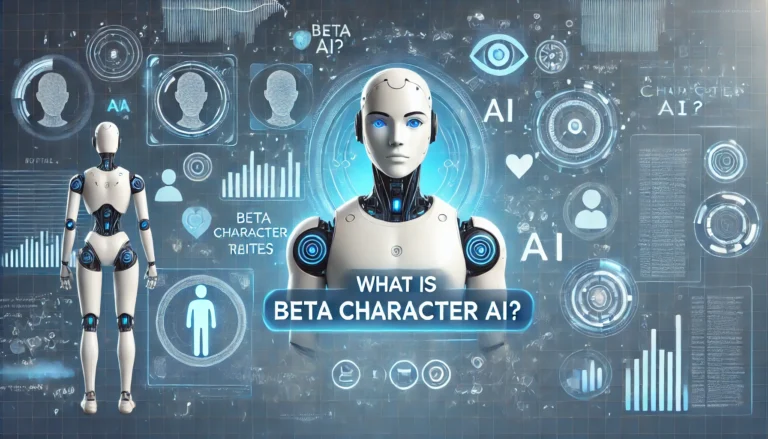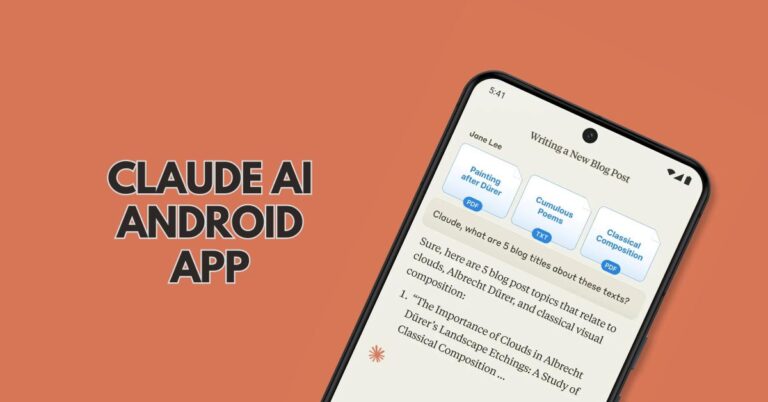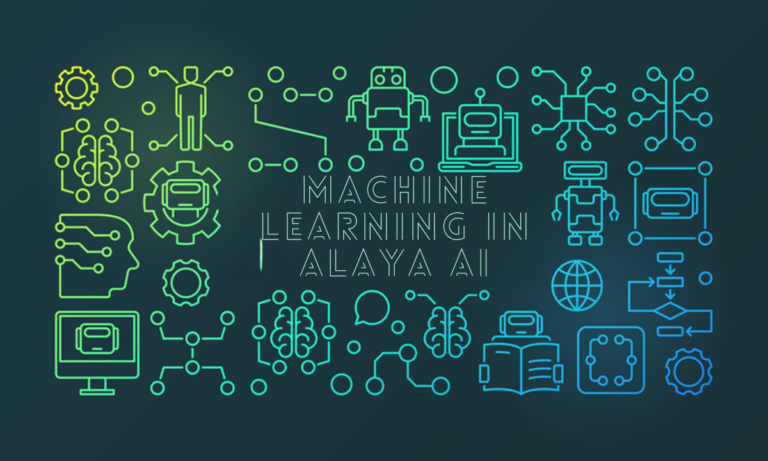Exploring AI Media: Definitions, Conceptual Model, and Research Agenda
The convergence of artificial intelligence (AI) technology and media operations is reshaping how information is disseminated and content is created. AI, increasingly embedded in media processes, marks the advent of a new era known as “AI media.” This phenomenon represents a fundamental shift where AI becomes integral to the production, distribution, and consumption of media. Ensuring that AI-generated content is AI detector free—meaning it can seamlessly integrate with human-generated content without detection—becomes increasingly important in this evolving landscape.
AI and Media: A Converging Pathway
The interaction between AI and media has been significantly accelerated by key events and advancements over the past decade. The Cambridge Analytica scandal was among the first to draw widespread attention to the potential misuse of AI in media, highlighting the ethical and trust issues at the intersection of these fields. Subsequently, AI-powered media production, exemplified by AI-generated content such as the Guardian’s robot-written article, further showcased the capabilities and challenges of this convergence.
Popular media, including science fiction narratives like Black Mirror and documentaries such as The Social Dilemma, have also played a role in reflecting and shaping public perceptions of AI in media. These narratives underscore the societal impacts of AI, particularly in how it influences human behavior and social dynamics.
The academic interest in AI-related media topics has surged, particularly within the social sciences and humanities. Research has increasingly focused on communicative AI technologies, synthetic media, and AI-generated content. These studies explore the blurred lines between human-generated and AI-generated communication, raising questions about authenticity, creativity, and the future of media.
Defining AI Media
AI media is characterized by the integration of AI into every aspect of media operation. Unlike traditional digital media, which primarily involved the use of technology to distribute content, AI media encompasses a broader range of activities. AI not only facilitates the creation and distribution of content but also plays a role in moderating, personalizing, and analyzing media outputs.
To better understand this convergence, it is essential to clarify the terms “media” and “artificial intelligence” as they are used within this context. Media refers to the institutions and technologies that transmit information, entertainment, and messages to audiences. Traditionally, media has evolved from “old media” (mass communication technologies) to “new media” (digital platforms and online networks). However, the term “new media” is increasingly seen as outdated, given the omnipresence of digital services and their integration into the AI ecosystem.
Artificial intelligence, on the other hand, involves computer technologies that simulate human intelligence through machine learning, natural language processing, and other advanced computational methods. In the context of media, AI drives automation, personalization, and content creation, making it a fundamental component of modern media operations.
The Conceptual Framework of AI Media
The proposed conceptual framework for AI media is based on the idea of “AI medialization,” where AI is not just an add-on to existing media processes but a transformative force that reshapes the very nature of media. This framework encompasses several key components:
- Data-Driven Media Production: AI algorithms are increasingly responsible for generating content, from news articles to social media posts. This data-driven approach allows for more efficient and targeted media production, but it also raises concerns about the quality and authenticity of the content.
- Personalization and Adaptation: AI enables media to be personalized to individual users’ preferences and behaviors. Recommendation systems, such as those used by Netflix and other platforms, are prime examples of how AI tailors media consumption experiences.
- Moderation and Ethics: AI plays a significant role in moderating content, particularly in managing misinformation and harmful content. However, the ethical implications of AI-driven moderation, including issues of bias and censorship, are critical areas of concern.
- Human-AI Interaction: The interaction between humans and AI in media is becoming increasingly complex. AI not only generates content but also interacts with users, blurring the lines between human and machine communication. This interaction raises important questions about trust, agency, and the role of AI in shaping public discourse.
- Sustainability and AI Ecosystems: The sustainability of AI-driven media operations is another crucial aspect of this framework. The environmental impact of AI technologies, along with the economic and social sustainability of AI ecosystems, must be considered in the development and deployment of AI media.
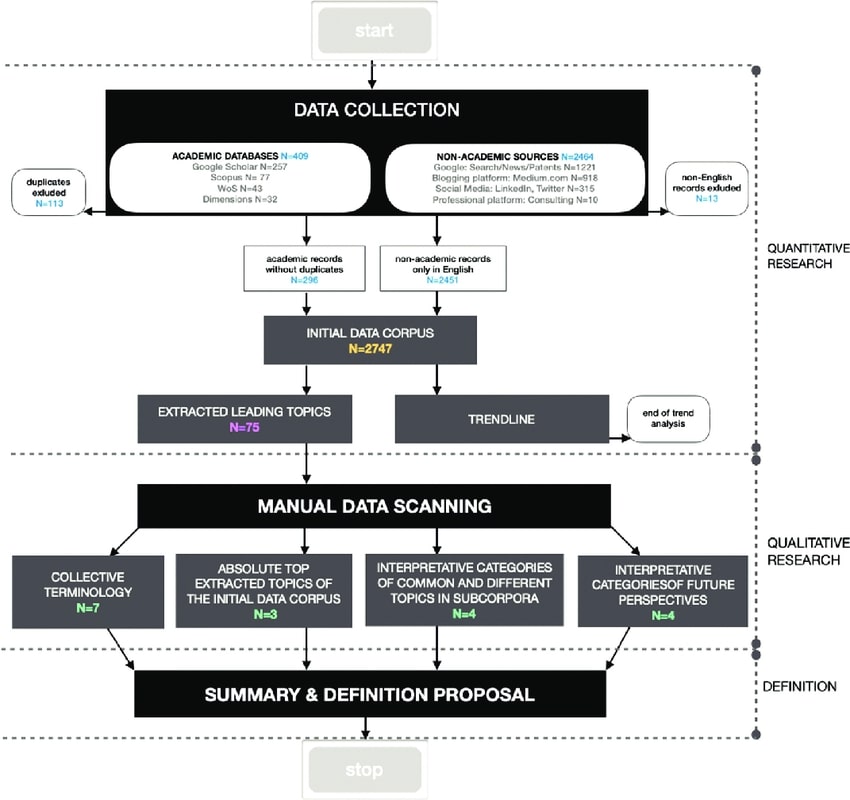
Challenges and Future Directions
The integration of AI into media operations presents several challenges that need to be addressed to ensure the ethical and sustainable development of AI media. These challenges include:
- Trust and Ethics: As AI becomes more involved in media production and distribution, issues of trust and ethics become increasingly prominent. Ensuring transparency in AI algorithms and addressing biases are essential for maintaining public trust in AI media.
- Privacy Safeguards: The use of AI in media often involves the collection and analysis of vast amounts of data. Protecting user privacy and ensuring data security are critical challenges that must be addressed to prevent misuse of personal information.
- Regulation and Governance: The rapid advancement of AI in media requires updated regulatory frameworks that can effectively address the unique challenges posed by AI technologies. This includes establishing guidelines for AI ethics, accountability, and transparency in media operations.
- Research and Innovation: Ongoing research is needed to explore the full potential and implications of AI media. This includes studying the impact of AI on media diversity, the role of AI in shaping public opinion, and the development of new AI-driven media formats.
- Global Perspectives: While much of the current research on AI media is concentrated in Western contexts, it is important to consider the global implications of AI media. Different cultural, social, and political contexts may require tailored approaches to the development and governance of AI media.
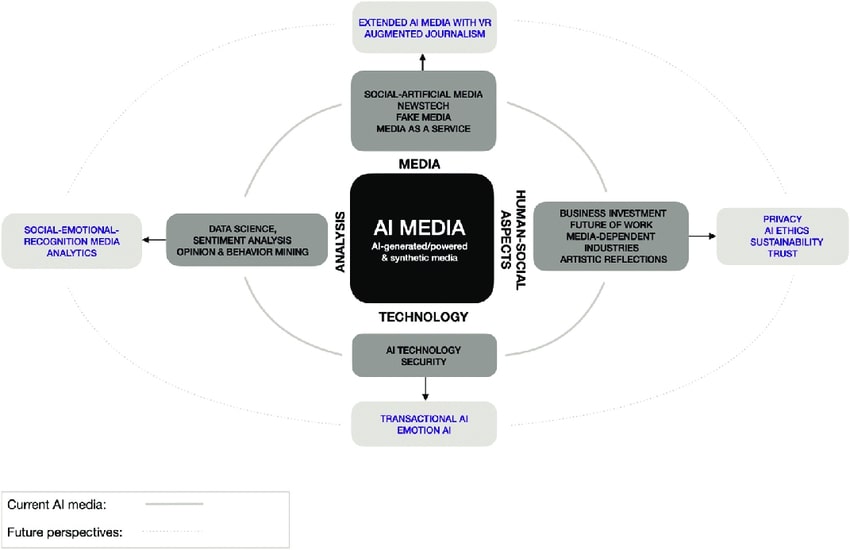
Conclusion
The convergence of AI and media signifies a profound shift in information production, distribution, and consumption. AI media represents a new phase in media evolution, with AI at its core. The proposed conceptual framework provides a foundation for understanding this emerging field and highlights key challenges and opportunities.
A comprehensive research agenda is essential to address the ethical, social, and technical dimensions of AI in media. Collaboration between academia, industry, and policymakers will ensure AI media evolves in a way that benefits society while mitigating risks.
The future of media is closely intertwined with AI, and understanding this relationship is crucial for shaping an ethical, inclusive, and sustainable media landscape.

